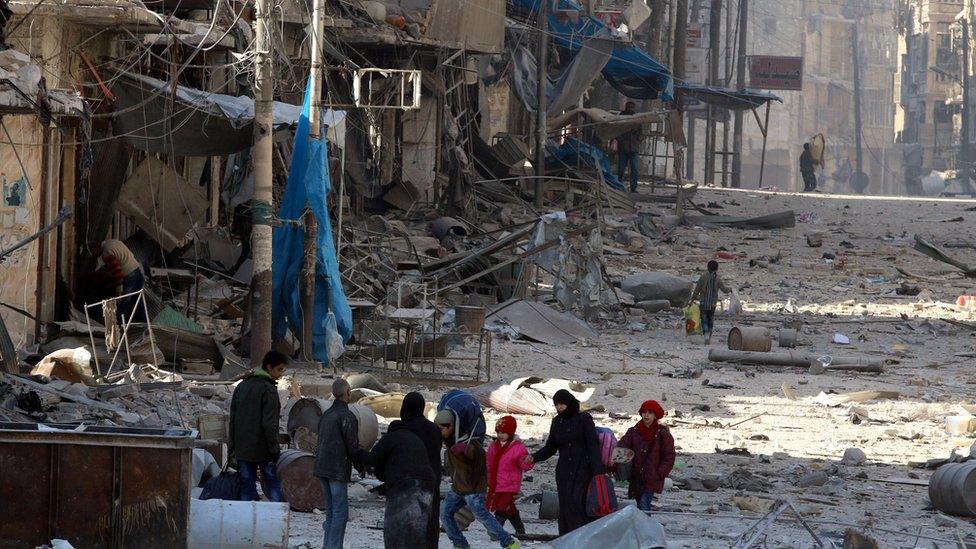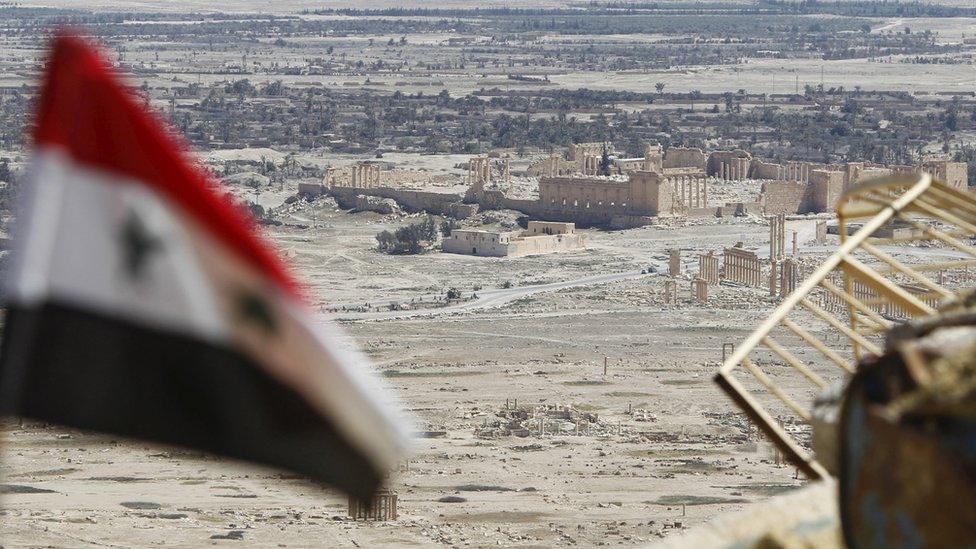Blame game starts as Aleppo's rebels fall
- Published

Aleppo residents desperately need help, but the UN cannot agree a way forward
The scene at the Security Council in New York on Tuesday afternoon was worth thousands of words about the failure of diplomacy in Syria.
Let's not forget that these were top diplomats talking about the gravest humanitarian emergency of our time and the most dangerous crisis in the world's most unstable region.
The UN's founders wanted the horse-shoe desks in the chamber of the Security Council to be the heart of global diplomacy.
Instead, in a blizzard of bitter criticism and recrimination, the assembled representatives of the world's most powerful countries demonstrated why the international response to a crisis like the one in Syria will always be paralysed when the permanent members of the Security Council are in deadlock.
US Ambassador Samantha Power, who made her name with a memorable book about genocide, compared what was happening in Aleppo to other scenes of slaughter "that define modern evil, that stain our conscience decades later. Halabja, Rwanda, Srebrenica and, now, Aleppo".
No journalist or diplomat has been able so far to investigate what is happening in Aleppo. But the reports coming from the city, if true, are horrifying.
Samantha Power asked Syria and its allies: "Are you truly incapable of shame?"
Ambassador Power asked Syria and its allies Russia and Iran a series of questions: "Are you truly incapable of shame? Is there literally nothing that can shame you? Is there no act of barbarism against civilians, no execution of a child that gets under your skin, that just creeps you out a little bit? Is there nothing you will not lie about or justify?"
Russian Ambassador Vitaly Churkin was scornful, accusing Ms Power of speaking "as if she was Mother Theresa".
He told her to remember the record of the United States, suggesting that she had no right to the moral high ground. Ambassador Churkin said he had no information about reports of mass arrests and unlawful killing in Aleppo.
Agonising
The collapse of rebel resistance in Aleppo does not mean the end of the war in Syria. The war will change shape, and will continue.
Anti-Assad rebels, of varying ideological hues, still control substantial territory in Syria. The jihadists of the so-called Islamic State hold a big chunk of the country, and took advantage of the distraction of Aleppo to recapture parts of Palmyra, the ancient city in the desert from which they were ejected earlier in the year.

Militants from the Islamic State group took back parts of Palmyra earlier this month
But as important is the fact that around a dozen foreign countries have intervened in the war. Bigger powers have broader agendas than the Assad regime or the militias that exist only to fight it. If they consider their interests are served by continuing the fight, in whatever form, then they will.
But even though the war has not ended, the Assad regime and its allies have scored their biggest victory. It is a significant moment, which has prompted more agonising about the mistakes that have been made.
George Osborne: We share responsibility for what is happening in Syria
In the House of Commons in London came the remarkable sight of the former Chancellor, George Osborne, disavowing the Syria policy of the government of David Cameron, in which he was a powerful number two to the prime minister.
"The Syrian civil war has been raging since 2011 and therefore it is something that we should have foreseen and done something about," Mr Osborne said.
"I think we are deceiving ourselves in this parliament if we believe that we have no responsibility for what has happened in Syria."
"The tragedy in Aleppo did not come out of a vacuum - it was created by a vacuum. A vacuum of Western leadership, of American leadership, of British leadership."

What did the West do?
US President Barack Obama said in 2012 that his red line with the Assad regime would be the use of chemical weapons
In August 2013, hundreds of people were killed in a gas attack around Damascus that rights groups and the White House attributed to government troops
Mr Obama sought congressional approval for military intervention in Syria, but it became clear he would not get it - instead he vowed to pursue diplomacy to remove the regime's chemical weapons
In the UK, parliament had already rejected the government's case for possible intervention, voting 285-272 against joining Mr Obama's abortive plan for air strikes

What could loosely be called the Western response to Syria's war has been a failure. Russia and Iran, along with the Lebanese fighters from Hezbollah, had a much clearer idea of what they wanted, which is why their side has won in Aleppo.
Russia and Iran will not want to lose their much enhanced position in Syria. Many rebel fighters might be yearning to put down their guns. But in a destroyed country that could be dominated by foreign intervention, warlords and militias for years, it might be easier to fight on than stop.
And there are those who do not want to stop. Here's a sample comment from the top JFS [Jabhat Fateh al-Sham, formerly known as the al-Nusra Front]-aligned cleric, Abu Yaqzan Al-Masri, in Aleppo: ""We won't compromise over our religion. We'll leave Aleppo on our own terms."